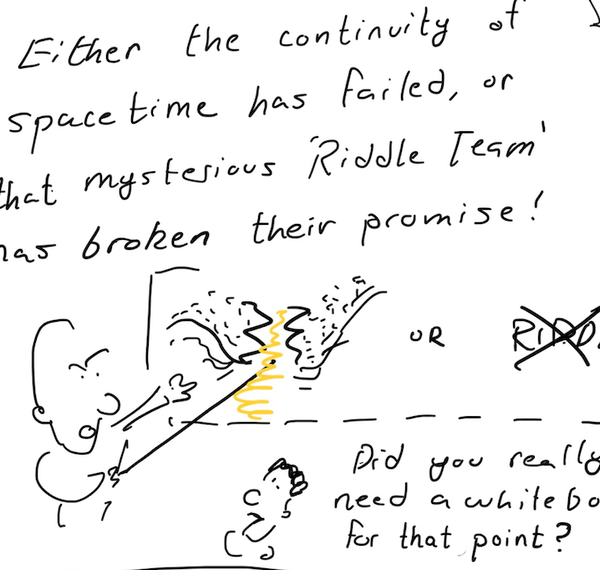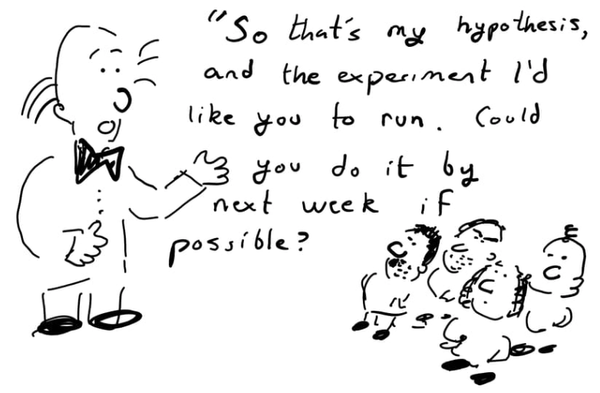Unreasonable Questions about Reason
What exactly is reason? In the age of AI, this question — once dismissed as philosophical nonsense — is vital.

Evolution, rationality, and the eigenvectors of the universe.
A reasonable man and an unreasonable man were seated at opposite sides of a coffee table. The reasonable man was busily engaged with the business of the day, but the unreasonable man, who had an incurable tendency towards philosophy, had his head in the clouds. He bit his lip, made several varieties of expressive noises, and at last addressed his companion.
“What is reason?” said the unreasonable man, “And how is it possible?”
A look from his stoic companion elicited elaboration.
“We live in curious times,” said the unreasonable man. “Two hundred years hence we humans were liberated from most physical labor by our invention of machines that could do this grunt work for us. Presently, we are engaged in a still grander undertaking: building machines that can do most of our thinking for us.”
“Reason,” he continued “is the human species’ trump card. We played it to escape the narrow confines of our evolved physique, to progress from a lanky primate to the perpetrator of mass extinctions and voyagers into outer space. When we endow our machines with rationality, a still greater array of utopian and dystopian futures are opened. But we are plagued with an odd problem: it is by no means clear what rationality is.”

The reasonable man had nodded several times during this speech, and at last, launched his mouth into motion with an air of scholarly condescension.
“The definition least likely to cause dispute is this:” said the reasonable man. “Rationality is the only alternative to randomness. If our random number generator does indeed generate random numbers, even Sherlock Holmes would search for patterns in vain.”
Here the reasonable man paused to give a short imitation of laughter, before continuing:
“Rationality is a way of making sense of information; on a deeper level, it is the ‘sense’ between information. To be rational is to notice patterns. This spawns my favorite definition: rationality is the ability to predict the future.”
To illustrate this point, the rational man produced a napkin and a pencil. “Given the beginning of this sequence,” said he, while sketching the numbers
1, 11, 21, 1211, 3112, 211213, 312213 …
“Given this, the intelligent rational agent can supply an infinite number of additional numbers. Given the position and momentum of every atom in the universe, the rational agent can (with the help of a supercomputer) prophecy everything that will ever happen.”
This seemed to be a perfectly operable definition, but our unreasonable inquisitor insisted upon asking further.
"I see,” said the unreasonable man, “that there are patterns in the universe which repeat themselves through time. I understand that rationality enables us to spot them, and thus to predict the future. But why do all of these patterns exist in the first place? Why, in other words, is so much of our universe rational?"
At this, the rational man shook his head slowly, and at length replied that the answer to that question was unclear and founded entirely upon potentially faulty speculation. But, if the unreasonable man really wanted to know (this he did), he would venture some thoughts on the subject.
“If rationality is indeed the ability to predict the future,” said the reasonable man, “we might gain some glimpse of its mechanism by studying the past, and observing how one era evolves into another.”
The unreasonable man assented that this seemed a reasonable course of proceeding.
“In so doing,” the reasonable man continued, “I believe we’ll find some notable connections between rationality, the process of evolution, and the creation and future of life itself. Let's start at the very beginning of the universe, in the immediate aftermath of the big bang.”
“We'll take for granted that the laws of physics (for some reason) exist, and act gently upon the sea of undifferentiated protons rapidly expanding into our current cosmos. This was to be the most random time in the history of the universe. No celestial objects persisted from one second to the next, but only amorphous, ever-shifting clouds of hydrogen. Like the static on an old television, all was in flux. Few patterns could be discovered, and few predictions could be made, without resorting to our friend with the supercomputer who tracks every atom in the universe. In information-theoretic terms,” said the reasonable man, with a slight twinge of his eyebrow, “this state carried the maximal amount of information. But slowly and surely, the steady forces of physics acted upon the amorphous matter, until something akin to the eigenvectors of physics took shape. Amorphous, ever-shifting matter never stays the same for long, so the ‘lifespan' of larger structures of matter is extremely short. Gravity-condensed clouds of matter, however, are more stable. And if those clouds of matter further condense into stars, they become all the more stable. So it was that the matter in flux continued to shift form until it had reached a stable state, while the rocks in a stable state shifted no longer.”
“This might be illustrated by imagining a peculiar universe which exists only in the static of a television screen.” As he spoke, the reasonable man sat back in his chair and gestured towards a nearby television which was, as he pointed, inexplicably engulfed by static. “The 'physics’ of this universe are simple: every second, every color present in the screen turns randomly into another color, unless the color is black. Every black pixel stays black.”
The unreasonable man nodded to demonstrate comprehension.
“This peculiar universe will undergo a similar evolution to our own. At first, a wonderful variety of colors fills the screen, and changes completely every second. This is akin to our early clouds of protons, whose motions and arrangements were in complete flux. But as time progresses, more and more pixels happen to turn black, and once black, remain so until the end of time.”
As he spoke, the television appeared to be short-circuiting. Larger and larger swaths of the screen turned black, until this was the only color visible.
“Black,” said the reasonable man, “is what the mathematically minded would call the ‘eigenvector’ of this physics — the value which stays the same throughout time. As the amorphous protons coalesced into first clouds, and later stars, asteroids, and planets, they were assuming forms which allowed them to 'stay the same' under the laws of physics.”
“Our universe is decidedly more complex than a television screen,” with another imitation chuckle, “but through these same processes, the eigenvectors of gravity came to dominate. The once chaotic, information-rich goo of amorphous protons evolved into ponderous arrangements of planets, stars, and galaxies, all tracing steady courses. In the beginning, predicting the future required an incredibly detailed knowledge of individual atoms. But now, the trajectories of the cosmos could be charted by astronomers with pen and paper. Our universe, in short, had become significantly more boring. Thank goodness this was only the first of its evolutions.”
“Which was the next?” inquired the unreasonable man.
“Why, the evolution of life,” replied the reasonable man. “I think you’ll find it very similar to the evolution of stars.” He continued:
“Fast-forwarding several billion years, we find that each of these newly hewn planets continues to witness chaotic dispersions of molecules on its surface. In one happy blue planet in particular, molecular arrangements were randomly forming and dissolving within a large, nutrient-rich ocean. Here, the same principle from before applies: most arrangements were scattered by the forces of physics, and only dense and hardy molecular arrangements (like rocks) stood any chance of persisting from one year to the next — until, that is, these molecules managed to produce fresh copies of themselves. This is the principle of life, the new ‘black’: the particularly complex macromolecule that performs the neat trick of self-replication will persist, while its inert cousins are soon to be swept apart. Within a few millennia, the oceans of Earth teemed with its first life.”
“Charming,” said the unreasonable man.
“It's notable,” replied his reasonable companion, “that although cyanobacteria and rocks both manage to persist through the eons, they do so quite differently. Any old rock is likely to be millions of years old because it is nearly indestructible. Its particular arrangement of matter has survived because it is largely immune to the weather of earth. A cyanobacterium specimen, on the other hand, is fragile and has a lifespan of hours. But by dint of its evolutionary brilliance, these fragile macromolecules have recreated the same arrangement for billions of years. Their genetic code has surpassed the physical realm, creating continuity not of any one structure, but of the blueprint. This second wave of evolution — genetic evolution — is the type of evolution we normally think of. Material evolution required billions of years to form the solar system we know; it was driven by ponderous and largely random forces. Genetic evolution, by contrast, shot a blazing burst of brilliance around Earth within a fourth of the time. Powered by the particular effectiveness of sexual reproduction, a vast number of species evolved to occupy all possible niches. Birds took to the skies. Anteaters took to ant hills. And one race of hominids took to extended vocalizations of a complexity which would ignite the third wave of evolution.”
The unreasonable man had settled into a skeptical countenance, so the reasonable man continued.
“Intelligence — by which I here mean ‘brains’ — had existed within life for some time. In limited quantity, it proved very useful to the reproduction of its species’ genes. But this localized intelligence had always faced a bottleneck. Any ideas conceived by one animal could only be passed to another to the extent allowable by miming and crude vocalizations. There could be no extended hunting strategy, no agricultural practices, certainly no stories. The mental sparks within one animal were consigned to perish with their originator. All of this changed with homo sapiens.”
“I don’t know about that,” said the unreasonable man. “I think very often sparks of ideas still die because no one bothered to listen.”
“That is true,” said the reasonable man, “but it’s all in accord with the survival of the fittest. Perhaps those ideas were not fit to survive.”
The reasonable man followed this judgment with an eyebrow raise of such magnitude that no response was possible, so he continued his narrative:
“With the language of early humans came the identical stroke of luck that enabled the genetic pattern of the first bacteria to break free from its physical limitations. Here was a lanky primate with unusually capable vocal cords and an unusually developed brain. As the body of shared expressions we call language grew, the brain was challenged to evolve further. For the first time, ideas could pass beyond their creators. Stories could take on a life of their own. The evolving genes of the human species were joined by an evolving corpus of knowledge, at first passed on verbally, and later housed by towering libraries and server farms. This corpus enabled humanity to surpass its own natural limits; to develop agriculture, and the practice of husbandry, metallurgy; crafts, arts, sciences — everything, in short, which makes us human, and everything which prevents us from being human.”
This last sentence struck the speaker as so eloquent that it must be written down. The reasonable man was thus occupied for some seconds during which the unreasonable man ventured an opinion.
"I see, then," said the unreasonable man, "that we've had three waves of evolution: the material evolution that formed rocks, the genetic evolution that formed life, and that evolution of information that made modern society. But I fear that in all of this, the original question has been lost. What does rationality have to do with evolution and life?"
The reasonable man gave his most genuine chuckle yet before responding.
“If,” said he “as we premised, rationality is the ability to predict the future, and our whirlwind tour of the past 13.8 billion years reveals that the future is architected by evolution, it should come as no surprise that rationality is a species of evolution. That anteater might have had to wait for several hundred years to develop the prerequisite snout for ant-eating, but a gorilla has only to use a stick. Humans might have had to wait millennia for our brains to enlarge. Instead, we've found ways to build new brains (or, viewed differently, the human species’ parasitic body of knowledge has set about transferring itself to a better host).”
“So evolution is a kind of intelligence?”
“And intelligence is a kind of evolution,” responded the reasonable man. “They are both instances of rationality, though of varying strengths. They both guide whatever form of life employs them towards endurance through time — and this life could be a genetic code, a consciousness, or even a rock guided by gravity, if we are to define life as anything which persists successfully through time.”
The unreasonable man uttered a profound “Hmm.”
“Of course,” the reasonable man continued, “this tells us little about the actual machinery of rationality. Initial reproduction was evolution guided mostly by chance. Sexual reproduction upped the chances. Our neurons sketch a variety of interesting functions. Modern neural networks employ calculus to learn, suggesting that reason is, after all, math; varying approximations of the language of our universe, sketched in the heads of its occupants.”
The unreasonable man sat and contemplated this a while, and at last observed that it seemed a reasonable enough hypothesis. "But," said he "it raises many more questions than it answers."
"Such as?" prompted the reasonable man.
"Well, if this is right, then it seems the universe has some bias towards intelligence, which I suppose is really the same as life. Why is that? And how is it that each successive evolution brings greater complexities of life and intelligence, when the theory of entropic heat death suggests that our ultimate fate lies within a uniform molecular soup? And is there a fourth wave of evolution? Are we in the midst of it now? Will it be conscious? What is consciousness?”
But the reasonable man, at this torrent of questions, gave only a small smile as he donned a pair of noise-canceling headphones and resumed the business of the day.
(Do you have potential answers? Riddle.Press invites submissions for its “Unreasonable Questions” series. Send ‘em to questions(at)riddle.press.)





